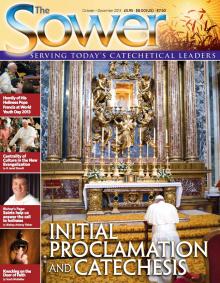The Lord invites us to boldness and fulness in our proclamation, to speak the word he gives to us. This way of speaking has a name in the Scriptures. It is found especially in the works of St Paul and St Luke, and it is a favourite on the lips of Pope Francis: parrhesia. The Catechism defines the term in this way: ‘straightforward simplicity, filial trust, joyous assurance, humble boldness, the certainty of being loved’ (CCC 2778).
God’s speech
Parrhesia is first of all a characteristic of God’s speech. When God speaks his word to us he addresses us fully and completely, keeping nothing back. In its section on revelation, quoting from St John of the Cross, the Catechism teaches that the Father ‘spoke everything to us at once in this sole Word – and he has no more to say...because what he spoke to the prophets before in parts, he has now spoken all at once by giving us the All Who is His Son’ (CCC 65).
When the Father speaks the fullness of his word to us, this word appears as a child. When God speaks his word to us he also addresses us in the way we can understand. Speaking fully and completely, at the same time he accommodates himself to our creatureliness. The wise men ‘rejoiced exceedingly with great joy’ at the vision of the star pointing them to the child (see Matt 2:9-10). This Child is the Good News. The Gospels all record the Father’s confirmation of this: ‘A voice came from heaven, “Thou art my beloved Son; with thee I am well pleased”’ (Lk 3:22; cf Matt 3:17; Mk 1:11; Jn 1:34). The Father speaks the fullness of his word, and this word is a beloved Son.
Our speech
It is into this fullness of speech that we are invited. We deeply realise our inadequacy, of course. But the Lord is not deterred: a seraphim touches the unclean lips of Isaiah so that he can speak, while Jeremiah’s ‘I do not know how to speak’ meets the brisk response, ‘Whatever I command you you shall speak’ (Jer 1:6-8; Is 6:1-8).
We can see from the description of parrhesia offered to us in the Catechism how our ‘humble boldness’ and ‘straightforwardness’ in speech flows from our insertion as disciples into the filial relationship of the Father to the Son. During the Passion, the Lord speaks to his Father about his disciples: ‘I have given them the words thou gavest me, and they have received them’ (Jn 17:8) It is because we are children (sons and daughters of the Son, who have received Christ’s words and so are able to speak simply to our Father in heaven as the Son taught us) that we are also able to speak in this way to others. And we become little children who can enter the kingdom of heaven and enjoy the love of the Father only when the Spirit makes us such, when we are ‘born anew’, born ‘of the Spirit’ (Jn 3:6-7).
Love’s overcoming
The English poet George Herbert (1593-1632) beautifully captures the invitation to receive God’s speech and the gentle overcoming of our reluctance, enabling us to find our voice in his dialogue of love. Herbert uses the image of Love drawing us to share his meal, an image at once reminding us of the scrolls given to the prophets so that they can internalise and then speak God’s word, and also of the banquet of love, prefigured in the Mass, and to which all people are called as their final end:
| Love bade me welcome; yet my soul drew back, | |
| Guilty of dust and sin. | |
| But quick-eyed Love, observing me grow slack | |
| From my first entrance in, | |
| Drew nearer to me, sweetly questioning | |
| If I lack'd anything. | |
| 'A guest,' I answer'd, 'worthy to be here:' | |
| Love said, 'You shall be he.' | |
| 'I, the unkind, ungrateful? Ah, my dear, | |
| I cannot look on Thee.' | |
| Love took my hand and smiling did reply, | |
| 'Who made the eyes but I?' | |
| 'Truth, Lord; but I have marr'd them: let my shame | |
| Go where it doth deserve.' | |
| 'And know you not,' says Love, 'Who bore the blame?' | |
| 'My dear, then I will serve.' | |
| 'You must sit down,' says Love, 'and taste my meat.' | |
| So I did sit and eat. |
This article is originally found on page 4 of the printed edition.
This article is from The Sower and may be copied for catechetical purposes only. It may not be reprinted in another published work without the permission of Maryvale Institute. Contact [email protected]

















